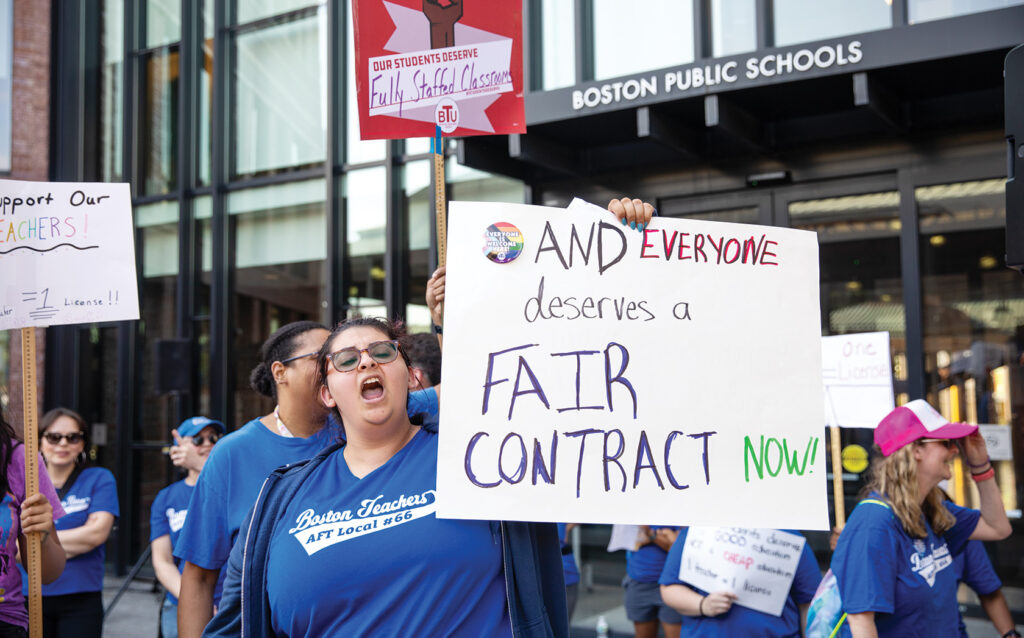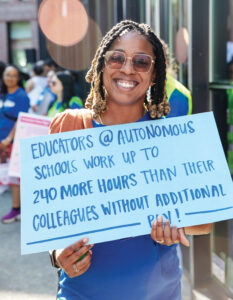Boston educators seek increased pay and supports in contract negotiations

The Boston Teachers Union rallied June 5 outside the Bruce C. Bolling Municipal Building as the union works through negotiations with the district around a new contract for its staff.
The union, which represents over 10,000 teachers and other professionals in the district, is seeking a number of updates to their contract, with a large focus on improving staff pay, improving facilities and student support and decreasing what they view as excessive workload for teachers.
“Being a teacher these days is an incredibly stressful role. When educators are not provided the same additional supports that teachers elsewhere are provided, it makes the job next to impossible and is one of the reasons it’s hard to retain people in our schools,” said Erik Berg, incoming president of the Boston Teachers Union.

Boston Teachers Union rallied June 5 outside the Bruce C. Bolling Municipal Building. PHOTO: Boston Teachers Union
One prominent goal the union aims to address during negotiations focuses on bringing greater support into classrooms. Currently teachers are currently expected to juggle general instruction while also providing the more specialized support for students with Individualized Education Programs — also known as IEPs — or for those whom English is their second language.
The union hopes to end the expectation that educators will have more than one license to be able to meet those additional needs from students, said Berg, who currently serves as executive vice president and will be stepping into the union’s top role in mid-July.
“We feel that kids are being deprived of necessary additional supports and the district is saying, ‘Okay, you have to get your special ed license and you’re going to somehow provide this extra, specialized instruction in the context of your regular instruction,’” he said. “I think common sense would tell you that having a second teacher is better and you’re going to meet the kids’ needs more.”
“The reality is three licenses does not mean three teachers,” said J.D. Davis, a history and ethnic studies teacher in the district, who called pushes like the union’s ask around licensure “long overdue.”
BTU is also asking for an increase in pay, pointing to low salaries for some roles represented by the union, especially those like paraprofessionals, educators who assist teachers in classroom instruction.
Following a request for comment from the Boston Public Schools by the Banner, a district representative pointed to remarks BPS Superintendent Mary Skipper made during her regular update to the Boston School Committee at its iits June 5 meeting.
According to Skipper, the average salary of a paraprofessional is $44,000 per year, though the teachers union pointed to some salaries for paraprofessional roles falling below $30,000 per year.
During those remarks, she said one of the district’s main priorities in the negotiations was to “significantly increase” the wages of its lowest paid employees, like paraprofessionals and applied behavioral analysis specialists.
She said the district was looking to work with BTU to take an “equitable approach” and provide a greater wage increase to those roles as well as the teachers.
C.J. James, a paraprofessional in the district, said low pay has forced him to take two other jobs in addition to the role. Even still, he said he’s now considering if he can continue working at BPS.
The teachers union has proposed a $4-per-hour pay increase for paraprofessionals over each year of the contract, which would last through 2027.
“If it was included in the contract, I wouldn’t have to make a decision of if I’m able to stay with a job that I love with students that I love or to be able to take care of myself and my family,” James said. “That $4 increase that BTU is proposing would put a big step into what I’m able to do and make that decision for me.”
During her remarks, Skipper made little to no reference to the union’s asks around eliminating the model of having one teacher also hold licenses to handle IEPs and multilingual learners.
Progress in conversation with the district is “slow and steady,” Berg said, but he said those talks have yet to really dig into union priorities, like addressing the multiple-license model.
“We haven’t really scratched the surface of some of the more critical issues, in particular, this issue of the delivery of services to students with disabilities and multilingual learners,” he said.
According to a BTU summary of its bargaining efforts with the district from a May 30 session, the district said it was prepared to dedicate extensive time to discussing the issue, but in the same summary the union said the BPS had called its proposals on the topic “inflexible” and “impossible.”
In that same update the BTU reported that the district had rejected a proposal that would guarantee every school had a library, and proposals that would improve student access to mental health services, as another priority highlighted by the union is increases in the staffing for mental health specialists and other providers on school campuses to meet nationally recommended ratios.
Davis said he’s heard widely, from people on both sides of the teacher’s desk, that increased mental health access is needed.
“If we look at what data and research say, if we listen to the testimonials of countless numbers of students, and educators, and parents, and guardians and caretakers, there’s this common message about the need for more mental health support,” he said.
In her update at the school committee meeting, Skipper said the district aims and expects to iron out contract language with the union by the end of the month.
“We remain committed to finalizing a deal by the end of June,” Skipper said. “We know that this is just a few weeks away, but as we’ve narrowed the proposals, it’s allowed us to ramp up the meeting schedule to finalize language.”
Berg was less ready to commit to a timeline for the negotiations.
“Both the district and union have been coming to the table and we hope to continue to do so and reach an agreement sooner rather than later, but I can’t tell you that the timeline is going to be two weeks or two months or whatever,” he said.
According to Skipper, this timeline for negotiating a new contract is a break from tradition for the district, which she said normally waits until the existing contract expires to begin conversations around a new one.
In an effort to craft this new contract before the old one is out of date, the district and the teachers union began negotiating in February.
The contract discussion comes at a moment of transition for the Boston Teachers Union as outgoing President Jessica Tang moves to head the American Federation of Teachers of Massachusetts, the smaller of two statewide teachers unions.







